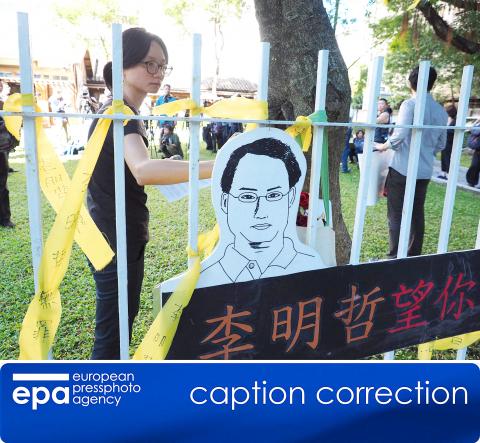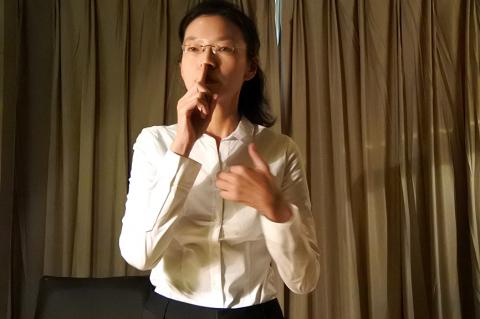A Chinese court yesterday sentenced Taiwanese human rights advocate Lee Ming-che (李明哲) to five years in prison for holding online political lectures and helping the families of jailed dissidents in a conviction demonstrating how Beijing’s harshest crackdown on human rights in decades has extended beyond China.
Lee’s trial was also China’s first known criminal prosecution of a nonprofit worker since Beijing passed a law in April last year tightening controls over foreign non-governmental organizations.
Lee went missing on March 19 after entering Zhuhai, Guang Province, from Macau. China did not announce his arrest until 10 days later.

Photo: David Chang, EPA
The Yueyang City Intermediate People’s Court in Hunan Province handed down the sentence after finding Lee guilty of subversion of state power.
Lee had confessed during his trial in September, which his wife, Lee Ching-yu (李凈瑜), dismissed as “a political show.”
His codefendant, Chinese national Peng Yuhua (彭宇華), was sentenced to seven years in prison.

Photo: CNA
Peng had also pleaded guilty, saying he had founded an organization called Palm Flower Co to pressure China to accept a multiparty political system and that Lee Ming-che was his deputy in charge of education.
Subversion of state power is a vaguely defined charge often used by Chinese authorities to muzzle dissent and imprison critics.
The court said both men said they would not appeal.
Lee Ching-yu, who attended the sentencing, said in a statement issued through her supporters: “A price must be paid in the pursuit of an ideal.”
“Striving for human rights for the underprivileged is a necessary dedication to promoting the progress of human civilization,” she said.
Supporters say that since the trial ended, Lee Ching-yu has been prevented from leaving her hotel room or meeting with anyone.
“Lee Ming-che took the risk despite knowing the dangers,” she said, adding that she was proud of him.
She said she was allowed to meet her husband for only three minutes, and he told her, through hand gestures, that he was wearing a covert listening device.
She said he told her to buy books for him, while she told him that the “free world” would continue to help in his rescue.
Former Democratic Progressive Party legislator Wang Li-ping (王麗萍), who on Monday accompanied Lee Ching-yu to Yueyang, but was deported, told a news conference in Taipei that China had monopolized jurisdiction over the case, despite the existence of cross-strait judicial agreements.
The case is a blatant example of Beijing seeking to extend its power while the Taiwanese government has acted passively, Taiwan Association of University Professors president Lin Hsiu-hsin (林秀幸) said.
Lee Ming-che was convicted for his online comments, a verdict that has grave implications for Taiwanese, Lin said.
Taiwanese have to either “comply with Chinese laws in Taiwan” or stay away from China, Lin said.
Judicial Reform Foundation executive director Kao Jung-chih (高榮志) said the trial ran counter to the rule of law, because Lee Ming-che’s lawyer gave up defending him, the right to review evidence and seek an appeal.
“The case does not concern Lee Ming-che alone, but all of us,” Kao said.
Taiwan Association for Human Rights secretary-general Chiu Ee-ling (邱伊翎) said they would continue to seek international assistance and present an account of the case at a convention of the UN Human Rights Council’s Working Group on Enforced or Involuntary Disappearances in Brussels in February, as China has not disclosed where Lee is being held.
Lee’s sentence was “incredibly harsh,” given the accusations against him and the lack of evidence, said Maya Wang (王松蓮), Human Rights Watch’s Hong Kong-based researcher.
“It’s probably designed as a warning to activists based outside China, particularly those in Hong Kong and Taiwan,” as Chinese President Xi Jinping’s ( (習近平) crackdown on dissent radiates beyond its borders, Wang said in an e-mail.
Amnesty International said Lee Ming-che was a victim of a politically motivated prosecution and that the evidence against him was not credible.
“He is the latest to suffer under the Chinese authorities’ relentless attack against human rights and democracy activists,” Roseann Rife, the group’s East Asia research director, said in a statement.

‘TAIWAN-FRIENDLY’: The last time the Web site fact sheet removed the lines on the US not supporting Taiwanese independence was during the Biden administration in 2022 The US Department of State has removed a statement on its Web site that it does not support Taiwanese independence, among changes that the Taiwanese government praised yesterday as supporting Taiwan. The Taiwan-US relations fact sheet, produced by the department’s Bureau of East Asian and Pacific Affairs, previously stated that the US opposes “any unilateral changes to the status quo from either side; we do not support Taiwan independence; and we expect cross-strait differences to be resolved by peaceful means.” In the updated version published on Thursday, the line stating that the US does not support Taiwanese independence had been removed. The updated

‘CORRECT IDENTIFICATION’: Beginning in May, Taiwanese married to Japanese can register their home country as Taiwan in their spouse’s family record, ‘Nikkei Asia’ said The government yesterday thanked Japan for revising rules that would allow Taiwanese nationals married to Japanese citizens to list their home country as “Taiwan” in the official family record database. At present, Taiwanese have to select “China.” Minister of Foreign Affairs Lin Chia-lung (林佳龍) said the new rule, set to be implemented in May, would now “correctly” identify Taiwanese in Japan and help protect their rights, the Ministry of Foreign Affairs said in a statement. The statement was released after Nikkei Asia reported the new policy earlier yesterday. The name and nationality of a non-Japanese person marrying a Japanese national is added to the

AT RISK: The council reiterated that people should seriously consider the necessity of visiting China, after Beijing passed 22 guidelines to punish ‘die-hard’ separatists The Mainland Affairs Council (MAC) has since Jan. 1 last year received 65 petitions regarding Taiwanese who were interrogated or detained in China, MAC Minister Chiu Chui-cheng (邱垂正) said yesterday. Fifty-two either went missing or had their personal freedoms restricted, with some put in criminal detention, while 13 were interrogated and temporarily detained, he said in a radio interview. On June 21 last year, China announced 22 guidelines to punish “die-hard Taiwanese independence separatists,” allowing Chinese courts to try people in absentia. The guidelines are uncivilized and inhumane, allowing Beijing to seize assets and issue the death penalty, with no regard for potential

‘UNITED FRONT’ FRONTS: Barring contact with Huaqiao and Jinan universities is needed to stop China targeting Taiwanese students, the education minister said Taiwan has blacklisted two Chinese universities from conducting academic exchange programs in the nation after reports that the institutes are arms of Beijing’s United Front Work Department, Minister of Education Cheng Ying-yao (鄭英耀) said in an exclusive interview with the Chinese-language Liberty Times (the Taipei Times’ sister paper) published yesterday. China’s Huaqiao University in Xiamen and Quanzhou, as well as Jinan University in Guangzhou, which have 600 and 1,500 Taiwanese on their rolls respectively, are under direct control of the Chinese government’s political warfare branch, Cheng said, citing reports by national security officials. A comprehensive ban on Taiwanese institutions collaborating or